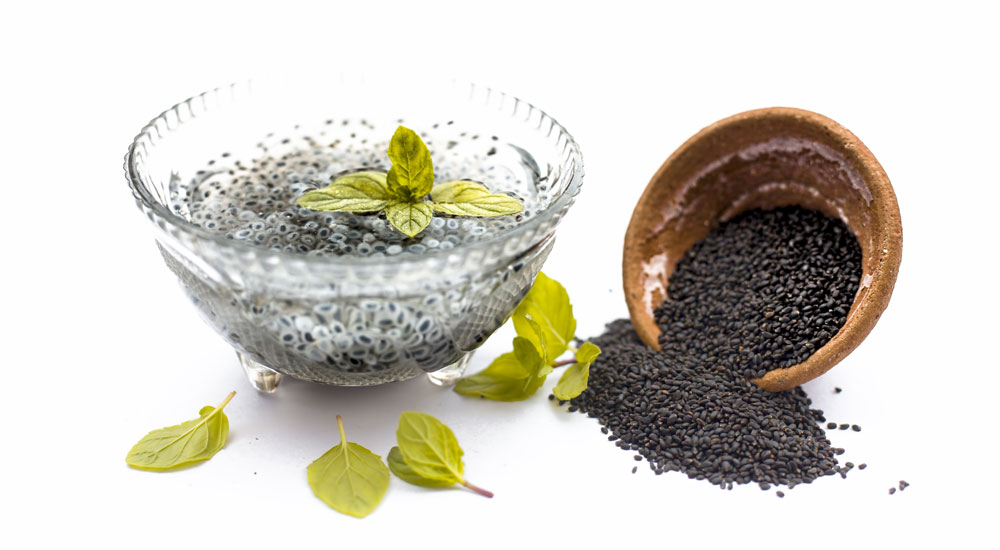
What the Heck are Basil Seeds?
You know I’m a big fan of seeds. My book The Need for Seeds: How to make Seeds an Everyday Food in your Healthy Diet was published three years ago and is available on Amazon. However, basil seeds weren’t on my radar when I wrote it. Today, basil seeds are becoming more popular in North America. What the heck are basil seeds? They’re seeds from the sweet basil plant, also known scientifically as the seeds of Ocimum basilicum. They’re commonly recognized as sabja and tukmaria seeds and grown primarily in India, Iran, China and warm regions of Asia.
Basil seeds have a fairly neutral taste, and are similar to chia seeds in nutrition and their ability to gelatinize when hydrated. They have a harder texture than chia, and can be ground into flour. Let’s explore more about basil seeds and health.
Basil Seeds and Health
Similar in nutrition to chia seeds, basil seeds are higher in fibre (7 grams per tablespoon/15 mL) and slightly lower in omega-3 fats. They are a good source of calcium and are high in vitamin K. Overall, many of basil seeds benefits can be attributed to its high soluble fibre content and micronutrient composition.
Bone Health
Basil seeds may be beneficial for osteoporosis prevention. One tablespoon (15 mL) has approximately 150mg of calcium. Calcium is essential to bone health and osteoporosis prevention. The daily recommended intake (DRI) of calcium for adults ranges from 1000 mg to 1200 mg/day. Overall, human clinical studies need to be completed to demonstrate basil seed’s potential to prevent osteoporosis.
Diabetes – Immune Health
Basil seeds due to its high fibre content may assist in the prevention and management of diabetes. In a rodent study, diabetic rats consumed an aqueous extract from basil seeds (1). It was found that the basil seed solution decreased their blood sugar levels and promoted the reestablishment of pancreatic islets.
In addition, a study conducted on type 2 diabetics that ate 10 grams of soaked basil seeds after each meal found a reduction in blood sugar levels by 17% compared to baseline(2). Basil seeds have the potential to be a functional food for the prevention and management of diabetes, however more human trials are required to study the dose/response relationship.

Healthy Living
With consumers, basil seeds have been sought after for weight management. In the rodent study (1) with diabetic rats, it was demonstrated that the basil seed solution decreased bodyweight within the diabetic rats. In general, improved blood sugar levels and satiety (feeling full) with fibrous foods like basil seeds, and a healthy lifestyle can lead to better weight outcomes.
What’s Next?
There aren’t any well documented adverse effects of basil seeds. One possible adverse effect, similar to any high fibre food, is potential bloating if consumed in too large amounts. In addition, as it is high in vitamin K, basil seed consumption is contraindicated if on blood thinners such as warfarin.
Overall, basil seeds are new to the North American consumer. They’re showing up in launches of functional beverages and are available in bulk on Amazon. They have the potential for bone health, immune health and weight management. However, more clinical studies must be conducted to solidify these human health benefits.
Remember no single food or ingredient is a silver bullet. A lifestyle filled with healthy habits including a balanced dietary pattern, exercise and restful sleep is the best approach for long-term consistent, mind body health. If you have added basil seeds to your healthy diet, let me know your thoughts about the flavour, texture and how you use it!
Jane and her team would love to assist your company to get into the latest better-for-you food trends or speak at your upcoming event! Click here to learn more.
References:
- Chaudhary S, Semwal A, Kumar H, Verma HC, Kumar A. In-vivo study for anti-hyperglycemic potential of aqueous extract of Basil seeds (Ocimum basilicum Linn) and its influence on biochemical parameters, serum electrolytes and haematological indices. Biomed Pharmacother. 2016 Dec 1;84:2008–13.
- Viseshakul D, Premvatana P, Chularojmontri V, Kewsiri D, Tinnarat P. Improved glucose tolerance induced by long term dietary supplementation with hairy basil seeds (Ocimum canum sim) in diabetics. J Med Assoc Thai [Internet]. 1985 Aug [cited 2019 Nov 5]; 68(8):408–11.
Copyright © 2019 Jane Dummer | All Rights Reserved
